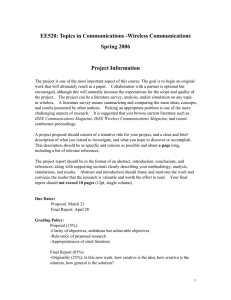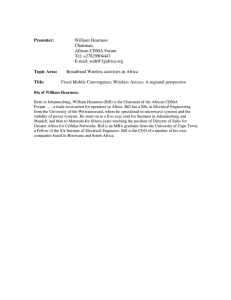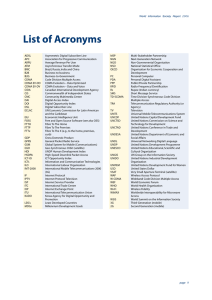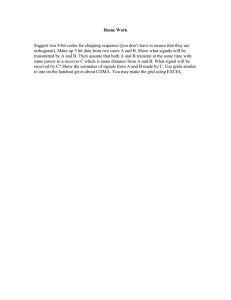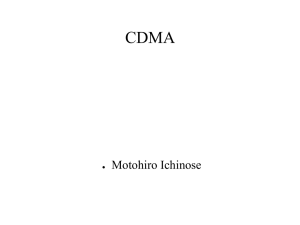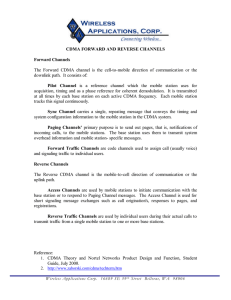Open Device Initiatives Breathe Life Into CDMA Networks
advertisement
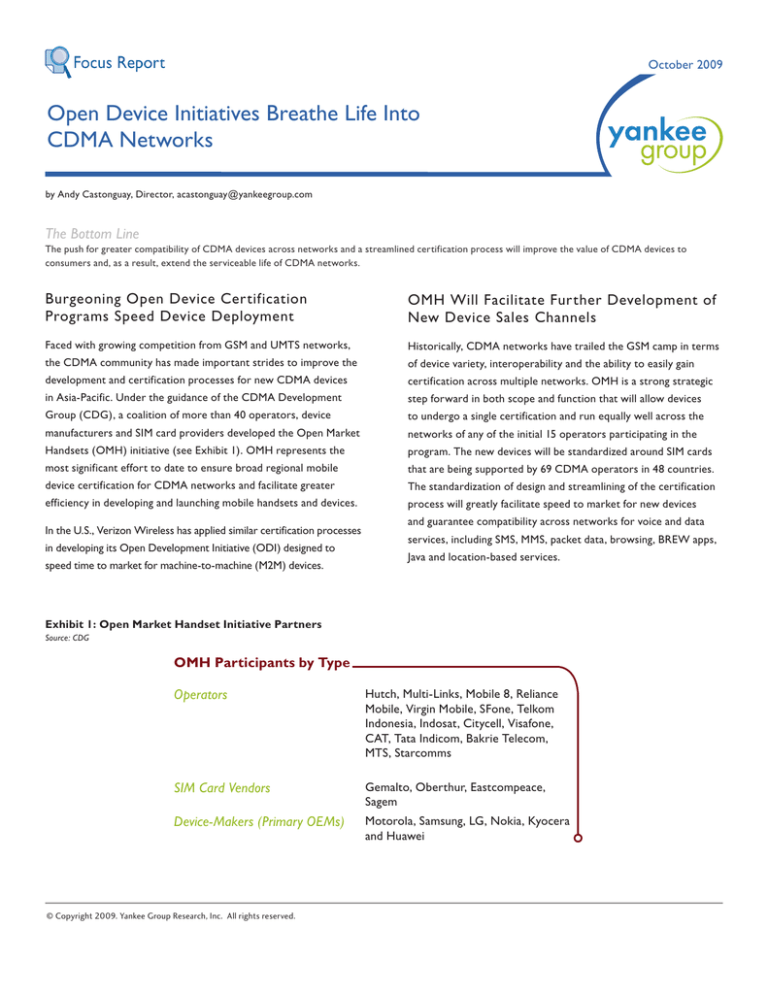
October 2009 Open Device Initiatives Breathe Life Into CDMA Networks by Andy Castonguay, Director, acastonguay@yankeegroup.com The Bottom Line The push for greater compatibility of CDMA devices across networks and a streamlined certification process will improve the value of CDMA devices to consumers and, as a result, extend the serviceable life of CDMA networks. Burgeoning Open Device Certification Programs Speed Device Deployment OMH Will Facilitate Further Development of New Device Sales Channels Faced with growing competition from GSM and UMTS networks, Historically, CDMA networks have trailed the GSM camp in terms the CDMA community has made important strides to improve the of device variety, interoperability and the ability to easily gain development and certification processes for new CDMA devices certification across multiple networks. OMH is a strong strategic in Asia-Pacific. Under the guidance of the CDMA Development step forward in both scope and function that will allow devices Group (CDG), a coalition of more than 40 operators, device to undergo a single certification and run equally well across the manufacturers and SIM card providers developed the Open Market networks of any of the initial 15 operators participating in the Handsets (OMH) initiative (see Exhibit 1). OMH represents the program. The new devices will be standardized around SIM cards most significant effort to date to ensure broad regional mobile that are being supported by 69 CDMA operators in 48 countries. device certification for CDMA networks and facilitate greater The standardization of design and streamlining of the certification efficiency in developing and launching mobile handsets and devices. process will greatly facilitate speed to market for new devices In the U.S., Verizon Wireless has applied similar certification processes in developing its Open Development Initiative (ODI) designed to speed time to market for machine-to-machine (M2M) devices. and guarantee compatibility across networks for voice and data services, including SMS, MMS, packet data, browsing, BREW apps, Java and location-based services. Exhibit 1: Open Market Handset Initiative Partners Source: CDG OMH Participants by Type Operators Hutch, Multi-Links, Mobile 8, Reliance Mobile, Virgin Mobile, SFone, Telkom Indonesia, Indosat, Citycell, Visafone, CAT, Tata Indicom, Bakrie Telecom, MTS, Starcomms SIM Card Vendors Gemalto, Oberthur, Eastcompeace, Sagem Device-Makers (Primary OEMs) Motorola, Samsung, LG, Nokia, Kyocera and Huawei © Copyright 2009. Yankee Group Research, Inc. All rights reserved. Open Device Initiatives Breathe Life Into CDMA Networks The first OMH device to hit the market, Samsung’s Mpower and devices. Even with these potential challenges, the growth of a 699, was launched in August 2009 in the Indian market. The new more direct device distribution model may potentially relieve mobile Samsung mobile device design included the OMH SIM card slot operators from the expensive task of maintaining device inventories that will allow the phone to be used on any CDMA network in and allow them to focus more on the services and customer India. By shifting to a SIM base, the CDMA manufacturers and care aspects of their business. From a consumer angle, OMH operators are transforming their strategic positioning within the devices will generally be seen as a benefit as greater development Indian market and eventually other OMH-enabled markets as efficiency should make device ownership less expensive while broad well. For 2010, the Indian market is expecting a growing array of interoperability will eliminate many of the technical difficulties OMH-capable devices from Samsung, LG, Huawei and others, associated with pre-OMH devices. As detailed in Exhibit 2 on the creating an important first wave of OMH devices in this quickly next page, the SIM card model is supported by the vast majority of growing market. The expanded portfolio of more flexible CDMA CDMA networks across the globe. devices will help Reliance Mobile and Tata Indicom compete against a strong array of GSM devices in a market where the average replacement cycle can exceed three to four years depending on the consumer market segment. In a highly competitive and predominately cheap prepaid mobile market like India, operators are keen to establish distribution channels that ease the financial Verizon Wireless’ ODI Paves Way for New Product Lines Unlike the operators in emerging markets, Verizon Wireless’ ODI program is currently less focused on the expansion of conventional burden associated with customer acquisition. mobile phones within the consumer market. The primary short-term Based on expected device launches, Yankee Group expects that devices and consumer electronics devices. The U.S. mobile device the OMH effort will begin to gain significant traction among market is so tightly controlled by operators, new device entrants to CDMA operators in South Central Asia in 2010. All five of India’s the consumer space will require extraordinary resources and channel CDMA networks currently support the initiative and will be joined arrangements to distribute their devices without specific marketing by CDMA operators in Indonesia, Nigeria, Thailand and Bangladesh support from a Tier 1 operator. The short-term strategic focus for by early 2010. Verizon’s Open Development group has been M2M products for One of the key strategic benefits of the OMH initiative will be the opening of the CDMA devices to a broader set of distribution channels. The combination of SIM slots and multinetwork certification will create a new level of device distribution that will favor the growth of direct sales channels, opening new doors for OEMs to go straight to the consumer market without securing operator interest. By expanding distribution channels and eliminating the difficulty of switching operators while keeping the same device, a vibrant OMH marketplace will significantly improve the long-term value of CDMA devices for consumers. An expected byproduct of this transition to OMH devices is the potential growth of gray-market device distribution. Expansion of gray-market devices will present a potential challenge to OEMs and operators, and they must work closely with retailers to ensure that legitimate OMH devices can compete effectively with graymarket goods. In addition, device manufacturers will need to work closely with prominent retailers to ensure that adequate financing mechanisms are in place to help drive the sale of OMH handsets 2 benefit of open development for Verizon will be a focus on M2M telemetry, sensors/monitors and other products. Verizon's recently established M2M-focused joint venture with Qualcomm, nPhase, will most likely be the first major beneficiary of the open development program’s ability to speed the certification of M2M modules (see the September 2009 Yankee Group Report, “Let the Vertical Integration of M2M Solutions Begin!”). This effort also shows solid promise as a catalyst for third-party companies to develop new distribution channels, particularly for specialized devices and M2M products and services, that will carry the marketing benefit of being certified on the U.S.’ largest carrier network. To date, CDMA modules are generally more expensive than competing GSM modules. The more streamlined development and certification process fostered by Verizon's ODI program will help CDMA module manufacturers get products to market quickly and evaluate their future potential for success. In a fast-moving and constantly changing marketplace, M2M players will need to adapt their products constantly to changing customer needs and, in a sense, fail quickly so that they can better identify winning products and services. © Copyright 2009. Yankee Group Research, Inc. All rights reserved. October 20 09 Exhibit 2: CDMA Operators Supporting SIM Cards Source: CDG EMEA Latin America AsiaPacific Afghanistan Aruba Bangladesh Afghan Telecom, Wasel Telecom EOCG Wireless Aruba (MIO) Angola Belize Pacific Bangladesh Telecom Ltd. (CityCell), Ranks Telecom (RanksTel) Movicel Telecomunicações Speednet Communications (Smart) Cameroon Cambodia Cambodia Shinawatra Co. (Camshin) CAMTEL (CT Phone) Bermuda Georgia Bermuda Digital Communications (CellularOne) China Cayman Islands DoCoMo Pacific (ex-Guamcell), IT&E Overseas Iberiatel Ghana Kasapa Telecom Iraq Kalimat Kazakhstan ALTEL (DALACOM) Kyrgyzstan AkTel (Fonex) Mauritania Chinguitel (Expresso) Moldova Internedstrcom (OK) Morocco Wana (Bayn) Namibia Telecom Namibia (Switch) EOCG Wireless Cayman Islands (MIO) Chile Claro Chile Colombia Mobile-8 Telecom (Mobile-8), Bakrie Telecom (Esia), TELKOM Indonesia (TELKOMFlexi), Indosat (StarOne) Codetel (Claro) Ecuador Movistar Ecuador Guatemala Japan Telgua (Claro), Movistar Guatemala Korea Haiti Oceanic Digital Jamaica (MiPhone) Jamaica Pakistan Peru Pakistan Telecommunication Company (PTCL Wireless) Venezuela Sudatel (Expresso) Tajikistan M-Teko Uzbekistan Perfectum Mobile Tata Teleservices, Reliance Communications, MTS Shyam Sistema,Virgin Mobile India Indonesia Multi-Links Telecommunications Ltd., Starcomms,Visafone, Rainbownet Sudan India Dominican Republic HaiTel SkyLink (Multiple Regions), Baykalwestcom (Wellcom), Enisey Telecom (Wellcom), Uralsvyazinform Guam Movistar Colombia Nigeria Russia China Telecom Movistar Peru Movistar Venezuela, Movilnet KDDI (au) LG Telecom Laos Lao Telecommunications (WinPhone) Mongolia SkyTel, G-Mobile New Zealand TNZ Philippines Broadband Everywhere, Bayan Telecommunications Taiwan APBW (Qma) Thailand Hutchison CAT (Hutch), CAT Telecom Vietnam S Telecom (S-Fone), Hanoi Telecom Yemen Yemen Mobile © Copyright 2009. Yankee Group Research, Inc. All rights reserved. 3 Open Device Initiatives Breathe Life Into CDMA Networks Verizon’s shift to open development will really depend on its continued ability to adhere to the streamlined certification process. As outlined in Exhibit 3, Verizon Wireless has managed to reduce the total time necessary to certify a device on its network from 12 or more months to approximately four weeks. Verizon developed this streamlined process around active partnerships with third-party technical labs, greatly distributing the workload and increasing the level of transparency for and focus of certification documents. As of Q2 2009, Verizon’s ODI program had already approved more than 60 products primarily destined for M2M services. Conclusions: OMH Success Is Crucial to Extending the Life of CDMA Networks Even with a highly successful implementation of OMH devices across major markets, the initiative is unlikely to change the tide of market share currently dominated by GSM and UMTS technologies. What this initiative creates, however, is a strategically important shift in devices that will extend the value and service life of existing CDMA networks. As the majority of Latin American CDMA operators have already abandoned CDMA technology for cheaper GSM options, the OMH initiative will be crucial to the continued survival and expansion of CDMA networks in emerging Exhibit 3: Verizon Wireless Shrinks Certification From 12 Months to 4 Weeks Source: Verizon Wireless Verizon Open Development Certification Timetable: Total of 4 Weeks markets in Asia, Africa, the Middle East and Eastern Europe. With a broad array of devices benefiting from a fast certification process and guaranteed compatibility across networks, CDMA operators will now be better positioned to address the needs of low-income mobile users who tend to use multiple send cards for better calling price options while maintaining a single handset. Since much of the growth of subscriptions will be generated by these low-income users, CDMA operators will be better positioned to compete with GSM service providers going forward. By opening and streamlining the device certification process, Verizon Wireless has gained stronger strategic footing against its Tier 1 competitors. This will become increasingly important Week 1 Weeks 2-3 Week 4 as competitors’ efforts, such as AT&T’s partnership with Jasper Wireless, will generate greater efficiencies in their own right for device development and certification. RF parametric testing Signaling conformance testing and feature validation Final certification Recommendations • CDG and operators must expand the OMH initiative to include the North American market. While the emerging While the short-term focus of this program is to expand the total market focus of early OMH operator participants will generate number of devices compatible with Verizon's wireless network, strong OEM interest and device volumes, North America’s 150 certification in no way guarantees Verizon Wireless is interested in million-subscriber CDMA market should not be left behind. carrying the devices in their own stores or backing those devices While the politics and technical challenges may be significant, with any marketing muscle. ensuring that the OMH is truly global will generate the scale necessary to ensure greater price compatibility of CDMA devices with competing technologies. Verizon Wireless, Sprint, Telus and Bell should strongly consider working in concert to develop a similar OMH process in North America, even as they invest in building out their LTE networks. Given the fact that LTE mobile handsets are still years away from true scale and affordability, these CDMA operators need to ensure that their current and short-term device portfolios are as competitive as possible. 4 © Copyright 2009. Yankee Group Research, Inc. All rights reserved. October 20 09 • OMH participants should develop financing arms to gain additional advantage. One of the key strategic goals of the OMH initiative is to facilitate more direct distribution of CDMA mobile devices from OEMs to consumers. Given the extraordinarily low cost of capital in the current era, OMH partners should develop new financing mechanisms to help qualified retailers extend the best possible terms to their consumers and drive greater affordability of CDMA devices. The streamlined certification process of the OMH program will already generate lower development costs for CDMA products. The combination of lower average sale prices (ASPs) and favorable consumer credit terms will greatly add to the competitive pricing of CDMA handsets and devices. © Copyright 2009. Yankee Group Research, Inc. All rights reserved. 5 Yankee Group—the global connectivity experts The people of Yankee Group are the global connectivity experts—the leading source of insight and counsel trusted by builders, operators and users of connectivity solutions for nearly 40 years. We are uniquely focused on the evolution of Anywhere, and chart the pace of technology change and its effect on networks, consumers and enterprises. For more information, visit http://www.yankeegroup.com/. Yankee Group has a global presence including operations in North America, Europe, the Middle East, Africa, Latin America and Asia–Pacific. Contact us at: Corporate Headquarters European Headquarters One Liberty Square 7th Floor BOSTON, MASSACHUSETTS 02109 617-598-7200 phone 617-598-7400 fax 56 Russell Square LONDON WC1B 4HP UNITED KINGDOM 44-20-7307-1050 phone 44-20-7323-3747 fax Yankee Group Link Yankee Group Link membership brings clients the insight, analysis and tools to navigate the global connectivity revolution. It provides timely, actionable and accessible research and data that analyze the impact of connectivity and the transformation it will create in driving enterprises and consumers to an Anywhere society. The result is an experience that no other market research firm can provide. Link Research Yankee Group’s qualitative research forms the core of our offerings, with analysis focused exclusively on the transformational effects of the connectivity revolution. Our research reports arm you with the insight and analysis to make the right decisions today and tomorrow. Link Data Yankee Group’s quantitative data analysis includes monitors, surveys and forecasts. Together with Link Research, our data connects you to the information you need to make the most informed strategic and tactical business decisions. Link Interaction Connect one-on-one with Yankee Group analysts to get answers to your most strategic and critical questions, as well as gain deeper insight into research and trends. We encourage you to have direction interaction with analysts through ongoing conversations, conference calls and briefings. Link Consulting Who better than Yankee Group to help you define key global connectivity strategies, scope major technology initiatives and determine your organization’s readiness to undertake them, differentiate yourself competitively or guide initiatives around connectivity change? Our analysts apply Yankee Group research, methodologies, critical thinking and data to produce expert, timely, actionable results. Link Events The Anywhere revolution won’t wait. Join our live debates to discuss the impact that ubiquitous connectivity will have on your future. Yankee Group’s events— live and online—offer our clients new insight, knowledge and expertise to better understand and overcome the obstacles to succeed in this Anywhere revolution. © Copyright 2009. Yankee Group Research, Inc. Yankee Group published this content for the sole use of Yankee Group subscribers. It may not be duplicated, reproduced or retransmitted in whole or in part without the express permission of Yankee Group, One Liberty Square, 7th Floor, Boston, MA 02109. All rights reserved. All opinions and estimates herein constitute our judgment as of this date and are subject to change without notice.
